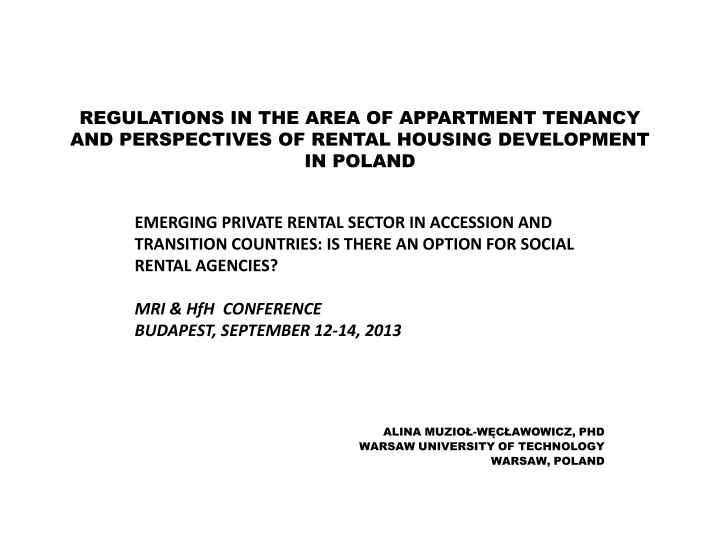
Regulations in Apartment Tenancy and Rental Housing Development in Poland
Explore the regulations and perspectives in Poland's rental housing sector, including the emergence of a private rental sector and the potential for social rental agencies. The content covers issues such as neglect of housing responsibilities, ownership structures, challenges in the private rental sector, and governmental plans for changing regulations. Additionally, it highlights statistics related to housing conditions and outlines the current state of the private rental sector in Poland.
Download Presentation

Please find below an Image/Link to download the presentation.
The content on the website is provided AS IS for your information and personal use only. It may not be sold, licensed, or shared on other websites without obtaining consent from the author. If you encounter any issues during the download, it is possible that the publisher has removed the file from their server.
You are allowed to download the files provided on this website for personal or commercial use, subject to the condition that they are used lawfully. All files are the property of their respective owners.
The content on the website is provided AS IS for your information and personal use only. It may not be sold, licensed, or shared on other websites without obtaining consent from the author.
E N D
Presentation Transcript
REGULATIONS IN THE AREA OF APPARTMENT TENANCY AND PERSPECTIVES OF RENTAL HOUSING DEVELOPMENT IN POLAND EMERGING PRIVATE RENTAL SECTOR IN ACCESSION AND TRANSITION COUNTRIES: IS THERE AN OPTION FOR SOCIAL RENTAL AGENCIES? MRI & HfH CONFERENCE BUDAPEST, SEPTEMBER 12-14, 2013 ALINA MUZIO -W C AWOWICZ, PHD WARSAW UNIVERSITY OF TECHNOLOGY WARSAW, POLAND
PROGRAM OF THE PRESENTATION 1. Introduction general overview 2. Introduction some statistics 3. Private rental sector 4. Governmental plans to change rental regulations 5. Chances for the Social Rental Agency
INTRODUCTION GENERL OVERVIEW 1. Long tradition of neglecting housing responsibilities of the public decision makers Low position of housing issues in the government policy and public budget Short-lived, variable set of instruments, especially financial Preferences for the private owner-occupied housing 2. Problems of the rental sector: Public: deficiency of funds sharp regulations for local governments Private: high legal risk non-competitive return on investment 3. Social context: Unfair attitudes towards public housing Inefficient NGO s (control of public authorities, support for social gorups in need)
INTRODUCTION SOME STATISTICS National Census 2011: 13,5 mln apartments 12,5 mln inhabited (92,9%) Ownership structure of appartments (%), National Census 2011 1 Individual person 2 Housing coop - owneroccupied 3 Local authorities 4 Housing coop - tenement type 5 State Treasury 6 Employers 7 Social Housing Associations (TBS) 8 Other 9 Unknown 64,1 15,4 8,7 2,9 1,6 1,6 0,7 0,3 4,7 Social rental : 12,9 % (3 + 5 + 6 + 7 + 8) Private rental : 5,3 8.0% (estimations) Private rental - occasional tenancy: 2,4% (estimations, Ministry of Finance data) Housing deficit: 0,7 1,5 mln (estimations) Substandard housing conditions: 10,6 % of apartments (National Census 2011) 11,4% of inhabitants (EUROSTAT)
PRIVATE RENTAL SECTOR 1. Slow recovering of pre-war private rental 2. Lack of new investment 3. Lack of real interest of the public authorities: Short episode with income tax deductions Last announcements on policy tools dated 2005 Limits to PPP in housing 4. Attractive regulations on renting in private sector, but: Time consuming procedures of eviction Costly services / input of work Limited resources for development 5. Polish contribution towards promoting private rental occasional tenancy
GOVERNMENTAL PLANS TO CHANGE RENTAL REGULATIONS 1. Implementation of time-limited contracts in public rental sector 2. Obligation to economize rent in public sector 3. Replacement of social housing (housing for very poor) by social rent 4. Departing from the catalogue of cases of unconditional right of tenants being evicted to social housing 5. Limitation of inheritance of title to rent 6. Implementation of occasional tenancy rules for economic entities
CHANCES FOR SOCIAL RENTAL AGENCY 1. Legal environment: no special tools, no specifc barriers 2. Supply side: lack of units on the market unfavourable differences in rent rates 3. Demand side: high but theoretical 4. Individualistic approach: possible implementation of functions of SRA on local scale, ie. facilitation of renting procedures by public housing institutions and/or in local urban regeneration programs






















